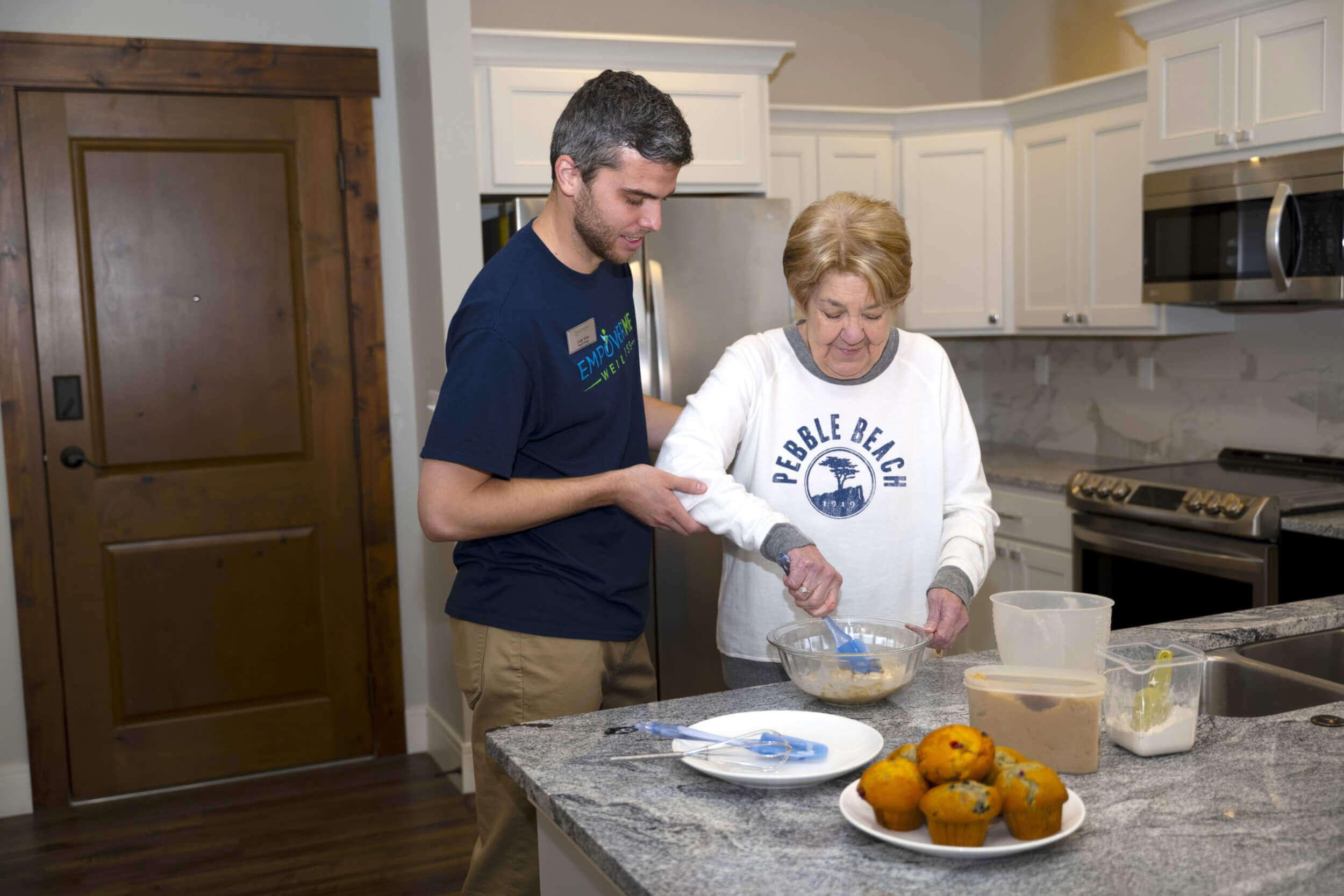Table of contents
Mealtime can be a challenge for seniors experiencing memory loss. Unintentional weight loss is a problem for 30-40% of patients experiencing dementia, and up to 68% of patients with severe Alzheimer’s Disease are at risk of malnutrition. This malnutrition can be due to either eating less or no longer getting adequate nutrients to maintain healthy body weight and muscle1.
Additional eating concerns for dementia patients include:
- Vision impairments that make it hard to distinguish the difference between foods or between the plate and the food.
- Difficulty seeing that food has been placed in front of them while looking in another direction
- Difficulty focusing on eating in the presence of other distractions
- A greater desire for sweets over protein, impacting muscle mass and mobility
- Weight loss as a result of forgetting to eat or forgetting about their appetite (especially common in Alzheimer’s patients)
In senior living communities, adjusting the social, environmental, and care approach in the dining room can alleviate many of these issues and encourage necessary nutrient intake.
Adjustments to Encourage Social Interaction
Socialization at mealtime is essential for the overall wellbeing for those experiencing dementia. In a 2021 study, researchers found that when adults ages 70-90 reported more frequent, pleasant social interactions, their cognitive performance improved for up to three days after the interaction2.
Correspondingly, socialization at mealtime is a daily opportunity to provide proven cognitive improvement for seniors.
To make socializing and conversing easier in a senior living environment, ensure that residents with impaired hearing or vision have hearing devices or glasses on. Also, consider seating residents with similar assistance needs near each other. This encourages empathy among communication abilities at the table and lessens the embarrassment residents may feel for needing assistance.
Caretakers can even participate at the table to stimulate conversation. It can be helpful to remind residents to engage or to help start the discussion, as cognitive deficiencies may make this difficult.
Adjusting the Physical Environment to Facilitate Eating
As helpful adaptations, consider using plates and tablecloths with more contrast to aid residents with impaired vision. Multiple studies have shown that using white tablecloths with red plates works well. Offer cups with lids to promote safe consumption of hot liquids, and adaptive utensils to maximize independence. Consider using plates that don’t slide across the table too easily or have an additional lip or divider to prevent spills.
Although music sets a nice tone in the dining room, keep music levels low enough that hearing-impaired residents don’t have to struggle to engage in conversation. Catering the music style and lowering the volume can also help minimize distraction. If TVs are in the room, avoid turning them on at mealtime to limit distractions and encourage conversation.
Dining chair design and selection can go a long way to encourage proper posture and maximize safety and alertness for memory care patients who have trouble swallowing.
Although eating adjustments and adaptations are necessary for residents experiencing dementia, maximize as much as possible to create the dining experience to feel like eating at home. Simple changes like not using disposable plates and improving food quality and presentation can make eating more enjoyable and encourage consumption.
Ensuring Personalized Levels of Assistance
Finally, as residents experiencing dementia likely need some level of assistance, caretakers should attune to residents’ individual levels of need rather than assuming their level of care. Knowing their individual needs maximizes independence and confidence while making eating more enjoyable.
Individual attention to their level of need might look like staying updated on the resident’s personal food preferences in order to maximize nutrient intake or understand their particular area of difficulty (chewing, remembering to eat, handling utensils, etc.).
Some residents may only need a reminder to pick up their utensils or to focus on eating, while others may deal with swallowing concerns and need full physical assistance. Remaining attuned to individual needs ensures seniors can experience the maximum amount of independence while getting the necessary nutrient intake.
With the right adjustments to the dining environment and level of care, you can help seniors experience their highest practical level of well-being in a way that honors their independence.
To see the impact of a personalized approach to memory care, hear the story of an EmpowerMe resident below, or click here to find an EmpowerMe community near you.


